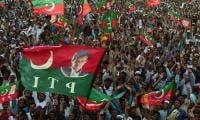ISLAMABAD: In what could be assumed to be a word of caution, Chief Justice of Pakistan (CJP) Justice Umer Ata Bandial Monday asked the Attorney General for Pakistan Mansoor Usman Awan to convey to the government that the time was still on their side to resolve the election matter politically lest it should face some other ‘unnecessary’ issue.
Justice Bandial heads the three-member bench of the apex court hearing the PTI’s petition challenging the postponement of elections in Punjab by the Election Commission of Pakistan to October 8.
The other members of the bench comprised Justice Ijazul Ahsen and Justice Munib Akhtar. After a day-long hearing, the court reserved the matter and held that the verdict will be announced on Tuesday (today).
The chief justice said the time for the announcement of the judgment will be issued Monday night. The court directed Secretary Defense Lt Gen (retd) Hamood-uz-Zaman Khan to provide facts in a sealed envelope Sunday night stating why the armed forces were not available to perform election security duty.
In pursuance of the court’s earlier order, the secretary of defence appeared before the court and requested an in-camera briefing on this matte being of sensitive nature. The court, however, directed him to submit a written answer in a sealed envelope and asked him to consider other forces like the Pakistan Air Force, the Navy and the Rangers if the armed forces were not available for the election duty.
The chief justice observed that the Pakistan Air Force and Pakistan Navy were equally respected. Justice Bandial asked whether the reserved army officials could be called for election duty. The secretary defence said for that purpose, there was a proper procedure to follow.
Justice Ijazul Ahsan said the court understood sensitive matters and did not want them to be public. He further observed that the court did not want to create issues for national security officials or the public.
Earlier, at the start of the instant proceedings, the court took exception to the PDM’s dissatisfaction with the bench. “How can you say that they have no confidence in this bench?” Justice Munib Akhtar asked the PPP counsel Farooq H Naek.
Naek raised questions about the maintainability of the petition adding that the matter related to Articles 17, 218, 224 and 254 of the Constitution “But when you don’t trust us, then why are you appearing before us?” Justice Munib Akhtar asked Naek.
Chief Justice Umer Ata Bandial asked Naek if he wanted to boycott the instant proceedings, then he should inform the court in writing. Why the coalition government wants to choose its own judges for deciding this important constitutional matter?” the chief justice asked Naek.
The chief justice observed that in order to avoid the present political turmoil, the political parties were given the option to resolve the matter through dialogue but none of the parties responded to the offer leaving the matter to the court to decide.
He said the court had to decide this constitutional matter adding that they were under the constitutional obligation to ensure elections in the two provinces in accordance with the law. “You have a duty to parliament. If you don’t, we will perforce act,” the chief justice remarked.
Barrister Akram Sheikh, counsel for the Pakistan Muslim League-Nawaz (PML-N), however, submitted that he wanted to assist the court on this important issue
He submitted that being a senior lawyer, he could make his own decisions if a party asked him to support something illegal adding that he respected the country’s highest court and also assisted it in the past on many legal issues.
The chief justice, however, observed that he respected all the lawyers, including Sheikh, Farooq H Naek and Kamran Murtaza, but the ruling parties had expressed no-confidence in the three-member bench.
The chief justice told the counsel that he was not before the court in personal capacity but represented a political party. Barrister Ali Zafar, counsel for the PTI, submitted before the court that the polls did not need fighters or any trained personnel to watch the scenes during the polling day.
The chief justice then asked the secretary defense that the court wanted to know if the security situation in Punjab was serious. The secretary defense replied in the affirmative adding that that’s why he had requested for an in-camera briefing and could not share the ‘sensitive information’ in the open court.
Ali Zafar submitted that the secretary defense could hire the services of retired people for the elections. The secretary defense, however, said that there was a proper procedure for calling the reserve force for the election duty.
The chief justice observed that a large number of troops were also stationed at the borders and the election duty did not require combat personnel. Additional secretary Ministry of Finance submitted a report to the court. The chief justice suggested him to cut the non-development expenditures.
At this, PTI Secretary General Asad Umer came to the rostrum and informed the court that elections in the Punjab and KP needed Rs20 billion. He said the required money could be adjusted from the development budget, as the government had allocated Rs700 billion budget but spent only Rs229 billion.
ECP counsel Irfan Qadir stated before the bench that the coalition government’s plea for the constitution of a full court was denied. The counsel submitted that earlier, the bench had issued a controversial judgment adding that it was important to examine whether the March 1 decision was by 4-3 or 3-2.
He further submitted that nine judges heard the instant matter of which four dismissed it, while the three asked the Election Commission to perform under the constitution for holding elections.
He submitted that justice should not only be done, but should seem to be done adding that March 1 order of the court was minority judgment and requested the court to resolve the differences. He further submitted that the four judges who dismissed the petition should be included in this bench.
Irfan Qadir submitted that President Arif Alvi had exercised his power with the advice of prime minister adding that giving date for the elections in Punjab by the president was unconstitutional, as he was bound to seek the federal cabinet’s advice.
As per Election Act 2017, the president can exercise his authority regarding the general elections, he said, adding that the general elections will be held countrywide at the same time.
The CJP remarked it’s beauty of democracy that those who faced allegations in past are now leading. He said they respect the institutions, adding that it’s good that elections are held simultaneously, but two assemblies stand dissolved and there is no political dialogue. He said that unfortunately the entire burden has been placed on the court. Extending elections date is solely court’s authority, none else’s, the CJP remarked. The court reserved the matter and held that verdict will be announced today (Tuesday).
Prosecutors will in coming week ask court in southern city Avignon to sentence 51 men
Both executives have not discussed specific measures to keep TikTok running in United States
Economy has improved somewhat over past few months, and reason for this is IMF programme, says Humayun
Bessent, chief executive officer of Key Square Group, has called for extension of tax cuts from Trump’s first term
Chief of Malaysian Royal Air Force, who is of Pakistani origin, paid visit to his native Beir, Haripur, on Saturday
Local and official sources say first explosion took place in Irab area in jurisdiction of Loy Mamond Police Station







